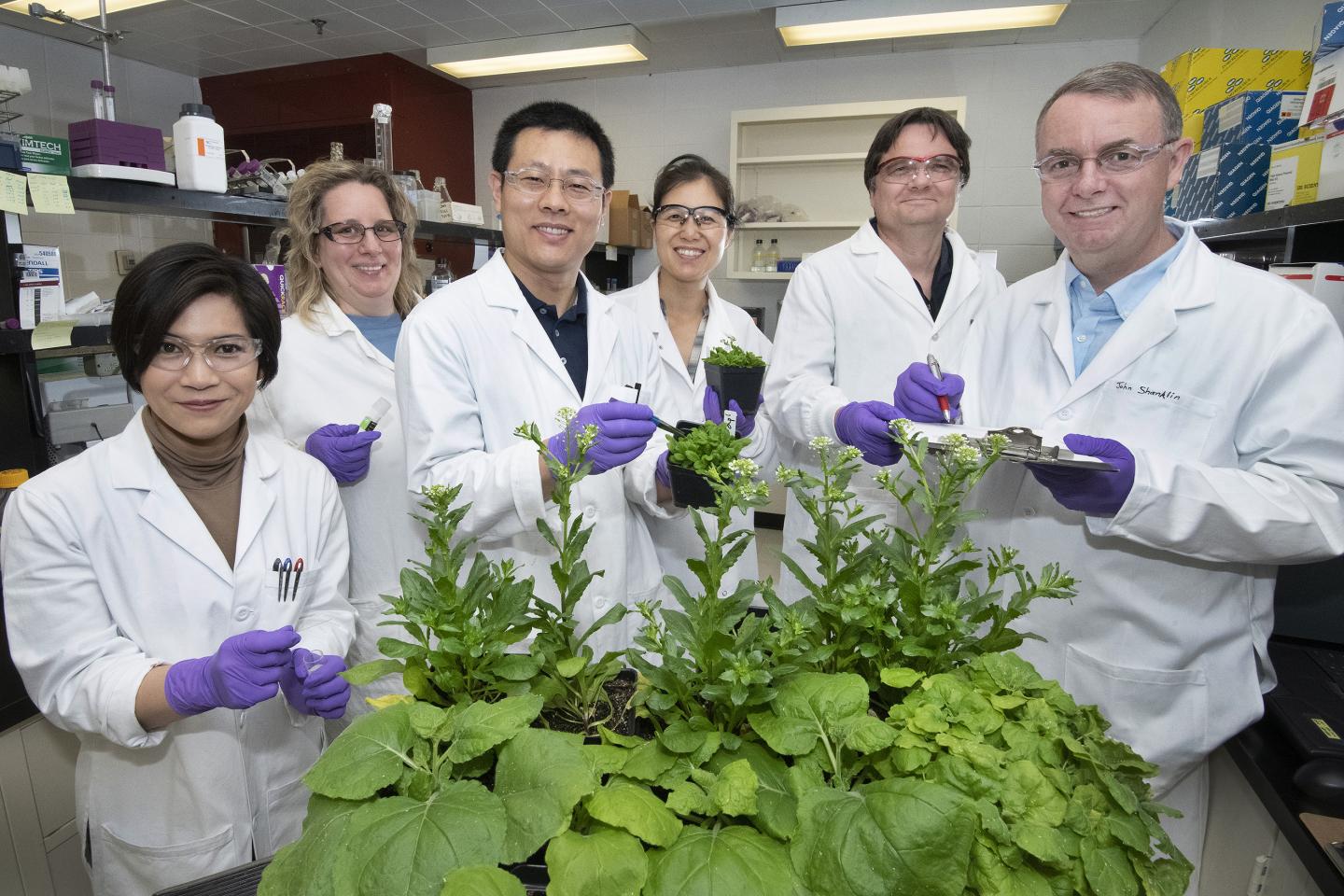Scientists discover seemingly paradoxical mechanism for regulating oil synthesis

Credit: Brookhaven National Laboratory
UPTON, NY–Scientists studying plant biochemistry at the U.S. Department of Energy’s Brookhaven National Laboratory recently made a surprising discovery: They found that a protein that turns on oil synthesis also activates a protein that puts the brakes on the same process. In a paper just published in the journal Plant Physiology, they describe how this seemingly paradoxical system keeps oil precursors perfectly balanced to meet plants’ needs.
“We were initially surprised by our discovery that the signaling protein that turns on the oil synthesis pathway also turns on the off switch,” said Brookhaven Lab biochemist John Shanklin, who led the research.
But after further investigation it made perfect sense. Fatty acids–the precursors to oils–can be toxic if allowed to accumulate. If the levels increase beyond the cell’s requirements for making lipid components of membranes or oils, the cells need a way to shut production off.
The key is that the off switch, a protein known as BADC, is a “conditional inhibitor,” Shanklin said. It only puts on the brakes when the level of free fatty acids is high.
This work could advance the team’s efforts to find new ways to control oil production in plants with the goal of making fuels or other useful products.
Putting the pieces together
The new study builds on previous work by Shanklin’s group. One of those studies [https:/
“We were interested to learn more about the BADC proteins, and how the genes for these proteins were regulated,” Shanklin said.
In another study [https:/
The scientists had little reason to suspect a direct connection between WRI1 (the on switch) and BADC (the off switch) until the lead authors, Hui Liu and Zhiyang Zhai, observed that plants with mutations in genes for either protein had unusually short roots.
“It would have been easy to overlook this connection as a coincidence, but Liu and Zhai’s observation turned out to be central to the mechanism we discovered,” Shanklin said.
Further investigation showed that the aberrant hormone levels seen in WRI1 mutant roots were like those found in roots of the BADC mutant. Closer biochemical-genetic investigations led the team to conclude that both proteins were indeed linked to this growth defect–which triggered them to explore the connection further.
Working with Brookhaven colleague Jorg Schwender, they showed that the WRI1 on switch bound tightly to the BADC gene, enabling it to be turned on. They confirmed the connection by showing that adding more BADC to the WRI1 mutant made the roots grow longer.
The key point is that having the on switch turn on genes for the off switch doesn’t necessarily turn fatty acid synthesis off. It just gives the cell a way to turn synthesis off if fatty acid levels get too high. And the more WRI1 ramps up fatty acid production, the more the cell also needs to ramp up BADC to be able to stop that process.
“It’s like giving a faster car the bigger brakes it would need to stop if a deer runs into the road,” Shanklin said.
“Making lots of membranes or oil will keep fatty acid levels low, and the BADC braking system won’t be needed,” Shanklin explained. “It’s only when production exceeds demand and fatty acids build up that the brakes need to be applied.”
The scientists are now conducting further biochemical studies to explore how elevated free fatty acids trigger BADC to become inserted into ACCase to put the brakes on.
###
This work was funded by the DOE Office of Science.
Brookhaven National Laboratory is supported by the U.S. Department of Energy’s Office of Science. The Office of Science is the single largest supporter of basic research in the physical sciences in the United States and is working to address some of the most pressing challenges of our time. For more information, visit https:/
One of ten national laboratories overseen and primarily funded by the Office of Science of the U.S. Department of Energy (DOE), Brookhaven National Laboratory conducts research in the physical, biomedical, and environmental sciences, as well as in energy technologies and national security. Brookhaven Lab also builds and operates major scientific facilities available to university, industry and government researchers. Brookhaven is operated and managed for DOE’s Office of Science by Brookhaven Science Associates, a limited-liability company founded by the Research Foundation for the State University of New York on behalf of Stony Brook University, the largest academic user of Laboratory facilities, and Battelle, a nonprofit applied science and technology organization.
Follow @brookhavenlab on Twitter and Facebook
Related Links
Electronic version of this press release with photos [https:/
Scientific paper: “Biotin attachment domain-containing proteins, inhibitors of ACCase, are regulated by WRINKLED1” [https:/
Removing the Brakes on Plant Oil Production [https:/
How a Molecular Signal Helps Plant Cells Decide When to Make Oil [https:/
Study IDs Link Between Sugar Signaling and Regulation of Oil Production in Plants [https:/
Media contacts: Karen McNulty Walsh [[email protected]], (631) 344-8350, or Peter Genzer [[email protected]], (631) 344-3174
Media Contact
Karen McNulty Walsh
[email protected]
Original Source
https:/
Related Journal Article
http://dx.



